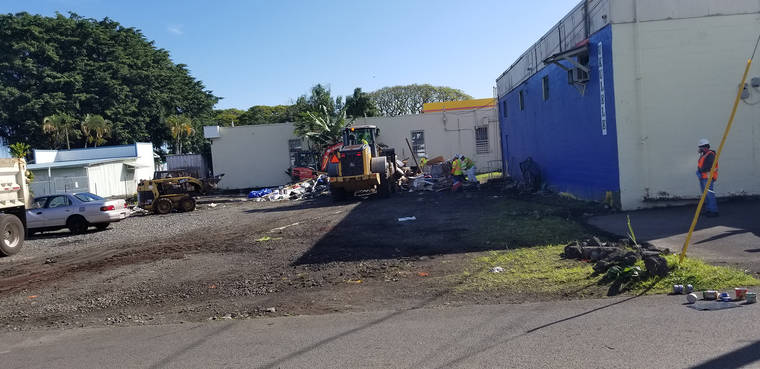A county operation to clear a downtown Hilo homeless camp Tuesday contradicted recommendations by HOPE Services Hawaii and federal guidelines to mitigate the spread of COVID-19.
HOPE Services, a nonprofit dedicated to ending homelessness on Hawaii Island, was one of several agencies that advised the county about how to handle a homeless camp on a lot at 117 Punahoa St.
But a statement by HOPE Services issued Wednesday said that the nonprofit had repeatedly counseled against sweeping the site and dislocating more than a dozen people living there.
Furthermore, said Kristen Alice, HOPE Services’ director of community relations, the county’s actions contradicted guidelines established by the U.S. Centers for Disease Control and Prevention aimed at mitigating the spread of COVID-19 among homeless populations.
“Even on a normal day, not in the middle of a pandemic, it’s counterproductive to sweep these camps,” Alice said. “It breaks the connections between the residents and their case workers, and it makes it harder to deliver necessary resources.”
But in the midst of a pandemic, such a sweep is even more ill-advised, Alice said, as it increases the risk of community spread of the disease.
Evicted residents also are forced to go out among the community to find necessary supplies, which were being brought to the camp by case workers — who had been regularly meeting with residents for weeks before the sweep, Alice added.
On its website, the CDC lists a series of recommendations for how to mitigate the spread of the virus among homeless camps, the first of which is: “Unless individual housing units are available, do not clear encampments during community spread of COVID-19. Clearing encampments can cause people to disperse throughout the community and break connections with service providers. This increases the potential for infectious disease spread.”
Alice said HOPE Services and the county had discussed an interim plan that would temporarily relocate the camp’s population to the Bayfront soccer fields until long-term accommodations could be arranged.
However, the county instead began the sweep at 6 a.m. Tuesday without notifying HOPE Services. Alice said HOPE Services representatives only arrived at the camp after being informed of the imminent sweep by someone else at the scene.
Barett Otani, executive assistant to Mayor Harry Kim, said the specific time of the operation was not shared among non-police agencies to preserve operational security, but added that HOPE Services had been told the operation would take place Tuesday.
“The mayor’s view is that these people had been continually advised to leave the area,” Otani said. “They’ve repeatedly refused services and were squatting on this property.”
The day before the sweep, the Third Circuit Court appointed a commissioner to manage the eventual sale of the property, which was seized from its previous owners after an unpermitted homeless camp was left unchecked on the site for the better part of a year. With that appointment, the county was officially granted full control of the property on Monday, making the camp residents trespassers against the county.
Otani said the county and HOPE Services had tried to figure out plans for placing the approximately 15 residents of the camp, but alternative sites were limited due to the ongoing pandemic stretching county resources thin.
“Our operations were limited; everyone’s maxed out,” Otani said. “So the mayor’s decision was just to continue with the mission. This has been in place for months.”
Four of the 12 camp residents who were present during the sweep were subsequently admitted to HOPE Services shelters, Alice said.
The remaining eight, however, were unaccounted for on Wednesday — Alice said representatives left contact information with the former residents, but without a regular point of contact with them, following up on their well-being will be difficult.
HOPE Services CEO Brandee Menino urged the county in a statement to heed the nonprofit’s recommendations in the future, which include not conducting homeless sweeps during a pandemic, giving the homeless community options on where to go in the interim, expanding shelter options, providing personal protective equipment and hand sanitizer to homeless communities, and following the CDC’s other COVID-19 guidelines.
Email Michael Brestovansky at mbrestovansky@hawaiitribune-herald.com.




